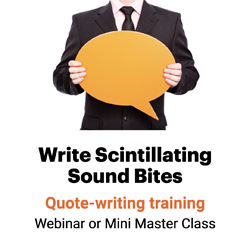Put the bite in the sound bite
Mark Twain once defined a sound bite as “a minimum of sound to a maximum of sense.”

So this quote, from The New York Times’ “Riches to Rags for New York Teenager Who Admits His Story Is a Hoax,” makes a lot of sense. The reporter asks the subject if he had in fact made any money at all.
“No,” he replied.
But how much sense does this quote, from a release posted on PRNewswire recently, make?

For the reporter’s perspective, I pulled three such quotes for a column I was writing for PRSA Tactics. However, I was able to use only one, because at 100 to 200 words, each sucked up 20% to 40% of my word count.
That doesn’t make sense at all.
So how long should your quotes be? Keep them to:
1. 20 words or less, plus attribution
Twenty words is the average length of a quote in one issue of The New York Times, which Wylie Communications analyzed a couple of years ago. (We skipped the sports pages.)
We found that, excluding attribution, The New York Times’:
- Average length of a quote was 19 to 20 words.
- Median length was 18 words.
- Most common length, with 22 examples in one day, was 7 words.
Can you write like the Times? Here’s what quotes of this length look like:
20 words:
“An officer can gain no Fourth Amendment advantage,” the chief justice wrote, “through a sloppy study of the laws he is duty-bound to enforce.”
18 words:
“He knew he was deserting the Army and would be charged, but killing himself was a bigger sin,” said Brig. Gen. Stephen Xenakis, a retired Army psychiatrist who testified for the defense during the sentencing phase of the trial.
7 words:
“You can predict behavior you can’t observe,” said Aleksander Obabko, a computational engineer at Argonne.
As long as you’re writing like the Times, why not target the news giant’s 7-word most-common length instead of its 20-word average?
Pro tip: Benchmark your preferred media outlets. How long are their quotes? How long are yours?
2. Pass the 1-2-3 Test.
When you write quotations, usually:
- 1 sentence is enough.
- 2 are OK.
- 3 are too many.
So DO write quotes like this, from the Times:
“You would think increased competition would cause price to go down, but it’s the opposite,” said Dr. Stein, the study’s author, who was then a student at Temple University School of Medicine.
DON’T write quotes like this — a 4-sentence, 177-word quote from a release on PR Newswire:

That’s a maximum of sound to a minimum of sense.
3. Even better: Make it 1 sentence.
Did I say 1-2-3? Let’s make it 1.
“Peel back the quote to one great sentence,” suggests Jacqui Banaszynski, associate managing editor at The Seattle Times.
Carving out the most provocative sentence alone can make your quote more interesting. Indeed, some of the most interesting quotes in The New York Times were just one sentence long.
Model quotes like this, from the Times:
When [Pope Francis] identified himself, the astonished telephone operator at the Jesuit Curia said his first thought was, “Sure, and I’m Napoleon.”
And stop writing quotes like this — a 4-sentence, 177-word quote from a release on PR Newswire:

That’s a lot of sound to a little bite.
So what if we peeled that quote back to one great sentence?
1. First, highlight the most interesting parts of the quote. Digging through all of the chest-pounding and self-adulation, I find this promising phrase:
“… street performance enthusiasts, hot rodders and racers …”
2. Now peel it back to one great sentence. If there’s nothing to interest readers in the quote, you might have to go out and dig up more details. Note that I’ve left a spot here for reader benefits:
“Hot rodders, racers and other street performance enthusiasts will now be able to do [XX] better, thanks to our merger,” Callahan says.
Pro tip: Take the one-sentence-quote pledge: Try limiting your quotes to a single sentence for the next month, and watch your sound bites become tighter and more interesting.
Shorter’s better.
Why so short?
Because short quotes sound better. They’re easier to read and understand. They’re sharper and more substantive.
“Even a lame quote will sound better if it’s brief,” writes Jim Ylisela Jr., president of Duff Media Partners.
Not only is he right, but he said it in 10 words. That’s a maximum of sense to a minimum of sound.

Leave a Reply